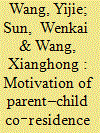| Srl | Item |
| 1 |
ID:
164727


|
|
|
|
|
| Summary/Abstract |
This paper examines the motivations of parent‐child co‐residence behavior in China using data from the China Health and Retirement Longitudinal Study. We test three possible motives: social norms, self‐interest and altruism. We find that social norms play an important role in household co‐residence behavior, showing that the belief that “sons take care of parents” is strong, and children in different birth orders take different responsibilities. Taking the one‐child policy as a natural experiment, we compared co‐residence behavior between only‐child and multi‐child families. This allowed us to test whether children in multi‐child families with wealthier parents more often co‐reside in order to compete for a bequest. We find that parents' wealth is more appealing to children in multi‐child families. The results support the life cycle theory that co‐residence decisions are motivated by self‐interest. We also find some evidence of altruism when parents and children make co‐residence decisions. These findings provide some insights for designing future elder‐support policies in China.
|
|
|
|
|
|
|
|
|
|
|
|
|
|
|
|
| 2 |
ID:
101154


|
|
|
|
|
| Publication |
2010.
|
| Summary/Abstract |
In this paper, I discuss the actual conditions and the determinants of co-residence between older parents and their children in China, especially the impact of bequest motives on parent-child co-residence, using micro data from the "Survey of Living Preferences and Satisfaction," conducted at Osaka University. More specifically, I use three subsamples of older respondents (those who live in urban areas, those who live in rural areas, and the pooled sample of both) to analyze the impact of bequest motives and other factors on the probability of parent-child co-residence. The results are as follows: bequest motives are strong in China, with more than 60% of respondents having a bequest motive, and the parent-child co-residence rate is also high (about 60%). Turning to the determinants of parent-child co-residence, children of urban parents are more likely to live with their older parents if their parents have a bequest motive, own their own homes, and live in an area where housing prices are high, a result which is consistent with both the selfish life-cycle and altruism models. Children are more likely to live with their older parents if their parents have a bequest motive in both the rural and combined samples, which implies that children are selfishly motivated and that the selfish life-cycle model applies in China.
|
|
|
|
|
|
|
|
|
|
|
|
|
|
|
|